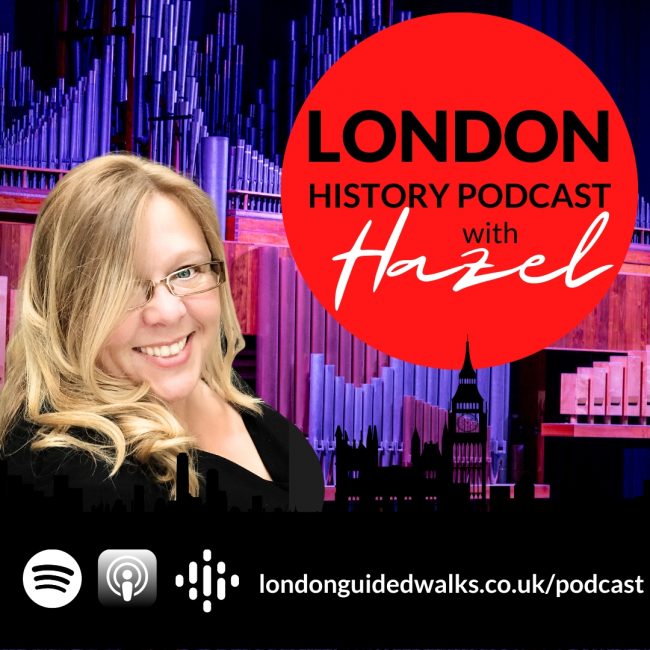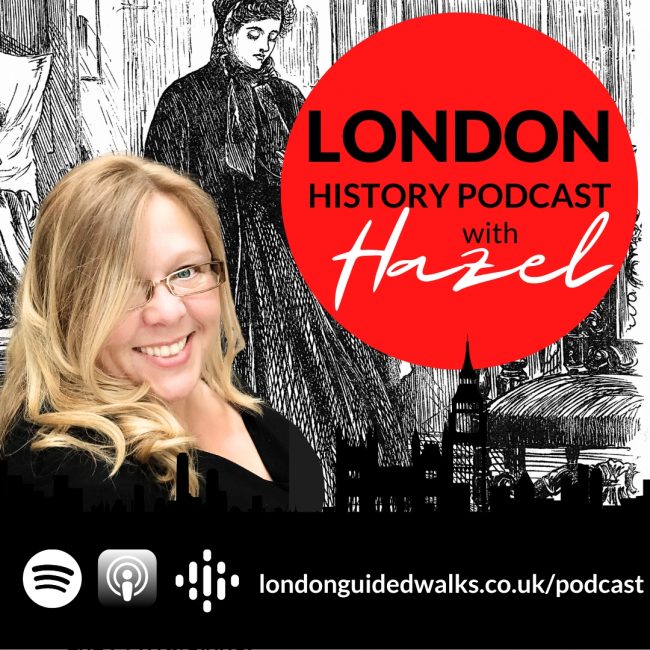Recommended Reading
Lodgers, Landlords, and Landladies in Georgian London, Dr Gillian Williamson

Your host: Hazel Baker
Hazel is an active Londoner, a keen theatre-goer and qualified CIGA London tour guide.
She has won awards for tour guiding and is proud to be involved with some great organisations. She is a freeman of the Worshipful Company of Marketors and am an honorary member of The Leaders Council.
She has been an expert guest on Channel 5’s Walking Wartime Britain (Episode 3) and Yesterday Channel’s The Architecture the Railways Built (Series 3, Episode 7).

Today’s Guest: Dr Gillian Williamson
I am an independent scholar. I received my PhD from Birkbeck, University of London in 2014 My thesis, which was published in 2016, was on the leading 18th-century monthly magazine, The Gentleman’s Magazine, and the way it articulated new ideas about masculinity and gentlemanliness. Since then I have been working on lodging as a socially and culturally important way of life in 18th-century towns and cities.
I published Lodgers, Landlords, and Landladies in Georgian London in the summer of 2021.
Show notes:
Hazel Baker: Hello and welcome to our London history podcast, where we share our love of London, its people, places and history. This podcast is designed for you to learn things about London that most Londoners don’t even know, all in 20 minutes. I am your host Hazel Baker, qualified London tour guide and CEO of www.londonguidedwalks.co.uk
Our walking tours are for those who love London and want to make the most of their time here, no matter whether it’s for a weekend or a lifetime. We aim to deliver insightful and well-prepared London guided walks with genuine enthusiasm and professionalism. And in this podcast, we try to do exactly the same.
Get that cup of tea, put your feet up and enjoy!
- Landladies of Georgian London
Hazel Baker: Today, we’re going to be continuing our conversation with Dr. Gillian Williamson, who has written a thought provoking book called Lodgers Landlords and Landladies in Georgian London. And I can certainly recommend this book. We did focus on lodges and landlords, including James Boswell, Elizabeth Inchbald, Amphra Benn, William Blake, Samuel Johnson, and Oliver Goldsmith in the previous episode.
And this time, we’re going to be focusing on Georgian landladies for the most part of it. We are joining the conversation when we’re just talking about reputation, not just reputation of the tenants, but also how the run landladies and landlords need to keep the reputation of their establishment so they get quality tenants in future.
I was going to say respectability is a currency in itself. Isn’t it?
Gillian Williamson: It is, and it’s a key word.
Hazel Baker: One of the things I get really frustrated about by reading historical fiction or watching period dramas. A lot of the time they always make the landlady a little bit about a hussy or penny pinching or that she offers services on the side, no matter whether it’s Peaky Blinders or whatever and it really frustrates me.
Why can’t women be business women?
Gillian Williamson: I know that’s why another thing I thought looking at it from the other side. I try to look at the lodging relationship from both sides, not just than what the lodger says, but also how it might have been to have a lodger. And that’s quite difficult because the sources of bias towards these generally men, but not always, there’s Amphra Benn and there’s Elizabeth Inchbald, but men who keep an account, which will write letters to their family about their lodgings.
So it’s quite difficult. And sometimes you have to imagine the life of the landlord or landlady on the other side. But yes, I think there’s this long running belief, or set of beliefs about landladies; they are either too sexy or old harridans, there are, they’re doing something on the side, they are mean, they won’t give you basically things for nothing, they add added onto the bill, there’s extras. But then they’re running a business and letting their rooms, why should they let you have the sugar for nothing? It was quite an expensive commodity. There’s an instance where Charles Lamb and his sister Mary get very worked up when (they were great lodgers). Because they didn’t have a lot of money they moved around a lot these various lodgings, and on one bill, they were given by a landlady included six pence for extra sugar that they’d use that week for a visitor who liked a lot of sugar in his tea. And they’re outraged, six pence is quite a lot for sugar. It probably was a rate above the actual cost of the sugar plus a bit of profit but they’re outraged, but then, sugar is a luxury product.
And why would the landlady give you that for nothing? She’s not your mother, she’s not actually your mother. You might find her motherly, but she isn’t your mother or a family or a friend. She is running a profitable business. In fact, the gentleman visitor who had used all this sugar and his tea was William Wordsworth coincidentally. So he always had a very sweet tooth, which I hadn’t realized. They behave as though landladies are doing this, particularly the women, out of the goodness of their hearts, rather than because they need the income. But I think if you read the other side, the landladies are often behaving in a very businesslike way.
Hazel Baker: Is it something about being in a patriarchal society where women are normally beholden to upon men are, either husbands or that they’re brothers, and suddenly they have this, what some people may perceive as a freedom to be a landlady, but actually it’s, it’s a means to an end. Isn’t it? You don’t have many options for earning money as a woman?
Gillian Williamson: No, you don’t. And so if you are a single woman, so you’re a widow, it’s a very good way. If you have a whole house, your husband dies quite a good way of being able to stay in the home you might love or you’ve lived for years or near your friends. And if, if you were a single woman with a trade; usually women’s trades are much less well-paid than men’s. So you get someone like Elizabeth Inchbald’s landlady, Ms. Bailey, an unmarried woman who is a milliner on the Strand. She’s also letting out at least two or three rooms, because we know there are other lodgers as well as Inchbald. And it’s a crucial underpinning to her ability to trade as a milliner.
It also gives you, whether you’re a man or a woman, if you can let the rooms out and have that little bit of income out of your house or shop. It means you can live in a slightly nicer area and then you’ll get better customers. So it’s a very, very important element of income for a lot of families. And obviously they don’t want to give it away for nothing.
Hazel Baker: No, of course not. Why would they?
Gillian Williamson: And I think though, you’re right. Those things go right the way through to the 19th and 20th century, I have started collecting postcards from the early 20th century which I buy off eBay, which are landlady and lodger postcards. There’s loads of them. I’ve got 60 now. I still think it’s because the jokes and the caricatures and the stereotypes are the same as in the 18th century; sexy landlady, harridan landlady, mean landlady who hits you with all the extras, who doesn’t heat the room properly, who doesn’t wash the sheets between lodgers. All those sort of things are what people thought then, or said then. And I think it is very interesting how the business-like woman is pushed to the margins.
Hazel Baker: And I suppose also, as you said, talking about, people with the power, often the men with who were actually literate for a start, they are the ones with the power. And it’s a bit like, I suppose, TripAdvisor now, when you read some of the reviews about, “they didn’t give us with a sea view”, but you didn’t ask for one or pay for one!
Gillian Williamson: It is the same. You get it, particularly because a lot of the sources. As a historian you’re very much at the mercy of what there is available for you to use for the research. And most of the people who leave written accounts of their time as lodges tend to be men. And they tend to be men who regard themselves as having a certain standing in society.
They’re not necessarily as grand as Boswell, but they feel comfortably a person, somebody of note and they tend, I think, when push comes to shove and things are going badly, they often regard landlords and landladies a bit beneath them socially. So things start going badly, they will be writing in their diary that they are vulgar, that they are common or that they talk too much, and you very much see that with Boswell but also with other people. So I think there’s often a social gulf between a lot of lodgers’ feelings about themselves and how they feel about the landlord. They actually slightly despise them right from the beginning. As is often in trade.
Hazel Baker: It’s also a mutually convenient relationship. Isn’t it? They need a roof over their head and the landlord needs someone in the room in order to earn money. So it’s not, it’s never going to be equal.
Gillian Williamson: No, it’s never equal. And ultimately of course it’s uneven; the balance of power lies with the landlord and the landlady; it’s their home. No lodger, even now, is there unlicensed, at the permission of the host, they can get rid of you at any time. They just tell you to go. And I think that is probably quite hard for some of the grander lodgers with a bit more notion of themselves; that they are men. They expect to be superior in society and some woman, they regard as lower class because she also sells hat trimmings or something, can tell them what to do. But fundamentally it’s her space and she sets the rules as Boswell found when he invaded the parlour in the evening. However grand he thinks he is, the Terry’s can tell him to go.
Hazel Baker: Yeah, it’s that power, isn’t it. Or the lack of power, which can turn quite bitter.
Gillian Williamson: I think some of them are really very uncomfortable with the power that the landlady has over them. It’s not something they are used to. And so they configure her as in some form of relationship, they understand better; she’s your mother, she’s your love interest, she’s a sort of quasi spouse, so they have to, or a servant. They have to put the landlady and that sort of bracket in order to be able to make sense of it. But in truth, she’s not, she’s dealing as a business person.
Hazel Baker: Now, one of the things that I loved reading in your book is imagining if I was trying to find lodgings for myself in Georgian London. I think we forget that there was a time before the internet. When I came to London, I just went on spareroom.com, people had their adverts up and I didn’t have to get cold or anything (it was January when I moved here). It was all done online. It was a very different world than actually treading the streets, looking for little cards in the window
Gillian Williamson: Absolutely the main way that people found a lot. You know what I was, you might have one already set up by friends or ask around, or have a connection with someone who would set you up before you arrived in London. But generally people expected to have to tramp around a likely street, looking at cards in the window and if they liked the look of it, they would knock on the door and ask to see the room.
That is the fundamental way people found lodgings in Georgian London. And actually quite often street scenes in satirical prints about lodgings do actually have that card in the window. That’s obviously not a historical source that survives. It’s just a piece of paper basically. But yes, that was the main way. And it’s course it’s very quick, the landlord or landlady can put it up instantly when they’ve got a room available and take it down when they haven’t. It’s cost is free and there’s no need to go through a middleman.
All those sorts of attempts to monetise that search fail I think because most people, nearly everyone was going to want to look at the room before they take it. So you can never cut out that going and knocking on the door, having a look at the room and seeing on the face of it if you and the landlord and landlady can get on. I think that the fundamental point, but basically it’s what I call haggling in the hall, where you get to know each other a little bit, and you’re coming to terms, how much a week? can you knock five shillings off the rent? Can I have free tea and coffee for that?
So, but basically, you do have to meet and have a look at the room. To get the sound from the street Boswelll said he looked at about 50 rooms to rent. He may be exaggerating before settling on Downing Street. Elizabeth Inchbald writes over and over about her trudge around the streets, looking for new lodgings. I think actually, if someone who read the book, because the way I’ve framed it, could, if they were propelled back to Georgian London they could find themselves in a room in London. They’d know what to do. I feel I would know what to do now. I would get a coach from where I live in Essex. It would land in Bishopsgate. I’d stay in a coffee house or an Inn overnight. And then I go trudging up and down Cheapside and perhaps the Strand, the high streets looking for a card in the window. That’s what you’d have to do.
Hazel Baker: I think I’m fully equipped now to go back in time. I’m not sure I’d really want to, my goodness!
One of the other things you mentioned is about the new London. So the, the emerging villages know now. While saying villages that are now blossoming into modern London. You mentioned Islington and of course, Kensington and Chelsea. This was a really critical time in their development wasn’t it?
Gillian Williamson: It was. They went from being small, rural villages where you might go and lodge in them because you were ill and it had better air. Places where you might go for a bit of recreation at the weekend.
Hazel Baker: Like the Mozarts.
Gillian Williamson: Yes, like the Mozarts. Or you might go to Islington for a weekend jaunt if the weather was nice. To being actually, really a part of London, which would just want one of the options in the lodgings market. And it’s interesting that in Allman’s New Suburbs gradually you get this creep of more regular lodgings, if you like, everywhere. There was a new development, for example, at Great Portland Street, which was a new bit of London, a bit suburban, and it rapidly filled up with lodgers. The stagecoaches were a bit more reliable. People were prepared to walk further and also you do get a bit cleaner air. It’s a bit quieter.
The fact that you can let these rooms underpins the property values in those areas. Of course, the knowledge that you can get a lodger, means that people that keep the rents at a certain level, which in itself means that for the developers, it’s more viable. To develop it because you’ve got this sort of long tail of financing right down to the person in the garrett.
It is interesting. Although some of them only really took off, the slightly more distant ones, when you’ve got the railway coming in. So they were always a little bit peripheral, but they did grow rapidly. So you’d soon get the same percentage of lodgers in someone like Marilyn Putney as you had in other bits of London. Filling the houses very much so.I will say originally when they were more remote, they were very much that we might go for peace and quiet because you didn’t want someone calling on you every five minutes because you’ve got respiratory complaints like the Mozarts, you had you off to Chelsea for their health.
So, yes, it’s interesting to think isn’t it, about what people thought of as London? So I think it goes to what people think of as London and central and what they think goes a bit peripheral. And always, in all the sources I looked at for respectable lodgings, it was never to the East. It was never east, towards the east end of London.
The only mention in the East End for lodging advertisements was Mile End Road, which has those late 18th century big terraced houses that perhaps ship Captains retired to. That’s the only area. So you have also, it shows up, I think, this growing gulf between respectful London and outcast London, places you wouldn’t want to lodge, the docks, Wapping, East End, St Giles, those sort of places.
Hazel Baker: It’s all quite fascinating. And I know I could talk forever with you because there’s just so much to learn.
Gillian Williamson: I think it just gives a different picture of London life, Georgian terraces, where they have those have uniform front doors. You think of them as family houses. I was just thinking if they opened the door they weren’t necessarily. Nobody expected them to be at the time. No one would have to expect the house to be a single residence.
Hazel Baker: You must’ve been like Sherlock Holmes piecing bits together from newspapers and that.
Gillian Williamson: I started off with life writing. So people’s memoirs and journals and letters and that’s why I’d noticed it. Because people were writing letters from Mr. West’s, the cabinet maker in the Strand, that’s what they have put. They haven’t got a house of their own, even though I think this one was David Garrick. He’s only living in a room in a Joinery shop, basically. And that’s what started it off.
Then I used legal cases. You have to be careful not to assume that everything ends up in crime or a murder or something disastrous, or you civil legal cases where people are in dispute over things. I use the advertisements in the Morning Chronicle which is a big circulation in London, daily. It has adverts which are digitally searchable. So I searched for all the adverts for lodgings, looking at the language that people used and what sort of person they were.
The advertisements showed that this was not a male world, that many women were looking for lodgings and people did not prefer to let to a man necessarily, despite this idea about sex work. There were as many women looking for lodgings or being, saying this is ideal for a woman as men, and then also surveys and things that people did of a district.
And then the serendipitous things where we started with the Compton Street fire. Well, I was looking at the City of Westminster archives. I put in lodgers and came across this fantastic set of records from a fire that had burnt down 16 houses and realised that in the 16 houses burnt down and those damaged on this one terrible night. First, luckily no one died, that’s really good. Someone was seriously injured, but nobody died. That the overwhelming number of people spilled out onto the street. And then make a claim against the charity was set up were lodgers. There was a tiny number of householders, 40 odd servants, two or three in a house perhaps, but this vast tail of lodgers and not necessarily just one person, someone with a child, someone with a wife and child, all living in one room.
And the records gave you that geography, which you don’t often get when whoever had been the secretary of this charity had said, so-and-so lives in the garrett at the back, this person lives in the first room at the front, and you can tie them into the household and know that they are, say a haberdasher or a green grocer.
And suddenly you’ve got a whole repopulation of a street and exactly who was in each room. And you realise what little space some household has kept to themselves, basically the minimum. So they’re letting out every room they can possibly spare and they, their servant and their children are living in really perhaps two or three rooms of a house.
But that, I think, was a real find and it really did make real that hierarchy of rooms and who lives with. And I’m quite hard, densely populated as an area like Soho was at the time, but that said, that was shear luck.
Hazel Baker: I’m not going to complain about being given a gift like that. What was a particular strength in the book was that, and this is something that you keep alluding to, it’s about the people. It’s not just about the transactions and dates. Being a historian. You do get swept up with dates and being factual, but there’s the human story there as well. And I’ve found that, getting to know these people a little bit more and worrying about them, even though they’re long gone.
Gillian Williamson: Oh. So I think it’s terrible to say, not really historical. I liked some people that don’t like others which is an awful thing to say ‘oh they’re quite sweet’ or ‘I’d have them in my house’ People ask who was the worst lodger you come across and Boswell’s quite bad cause he’s very high handed, but I think the romantic poets are absolutely the pits to have in your house because they don’t pay, they do a runner without paying, they’re drug addicts, they would bring their drug-addicted friends round to the house. It would be an absolute nightmare.
I think Coleridge, Samuel Taylor Coleridge has to be the worst lodger that you could possibly have in your house in the Georgian period. His friends said that actually, they said ‘Don’t have Coleridge in your house. You’ll regret it if you have Coleridge living with you’.
Hazel Baker: Brilliant. Well, thank you so much. This has been absolutely brilliant eye opening yet again, and I’m all popped to, and to investigate more on my, on my own time about this because it’s just fascinating. Thank you.
You can always join me for a guided walk or a private tour of Georgian London bookable online.
That’s all we got time for today. See you next time.














